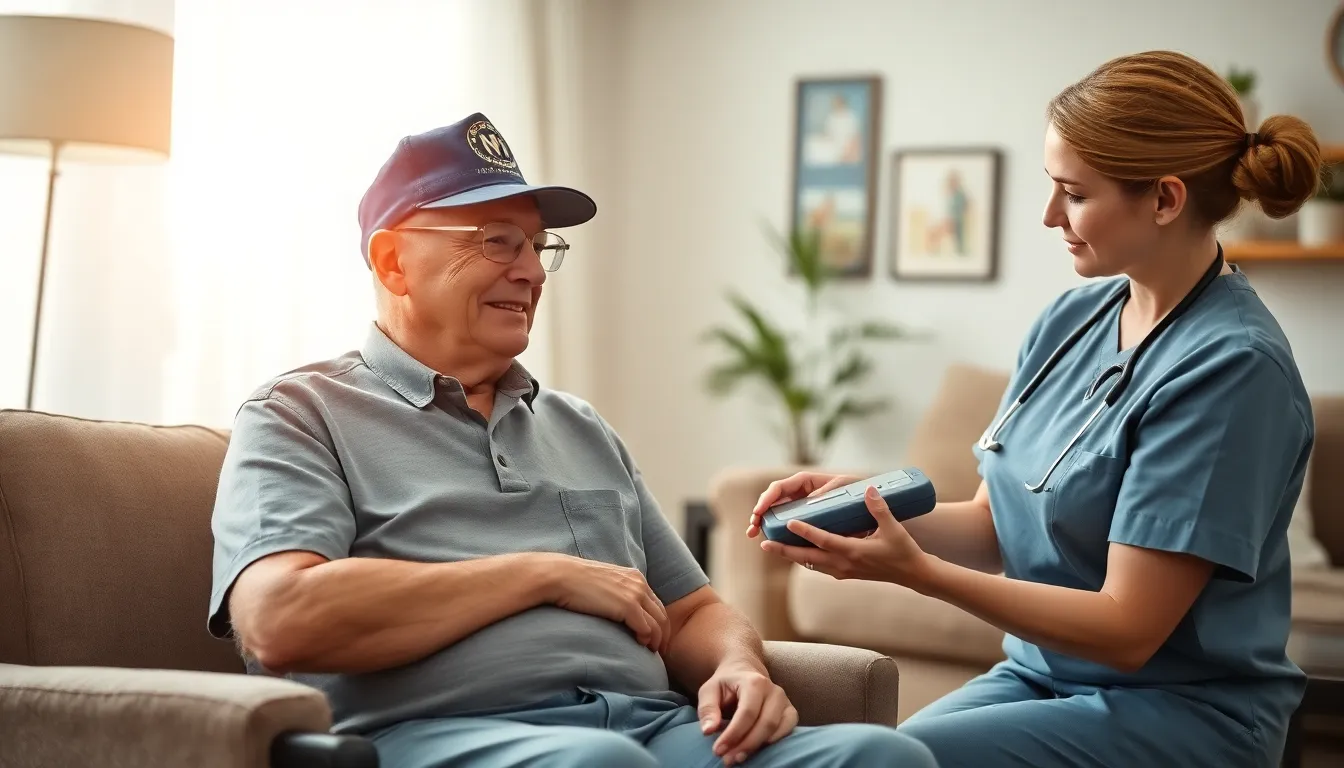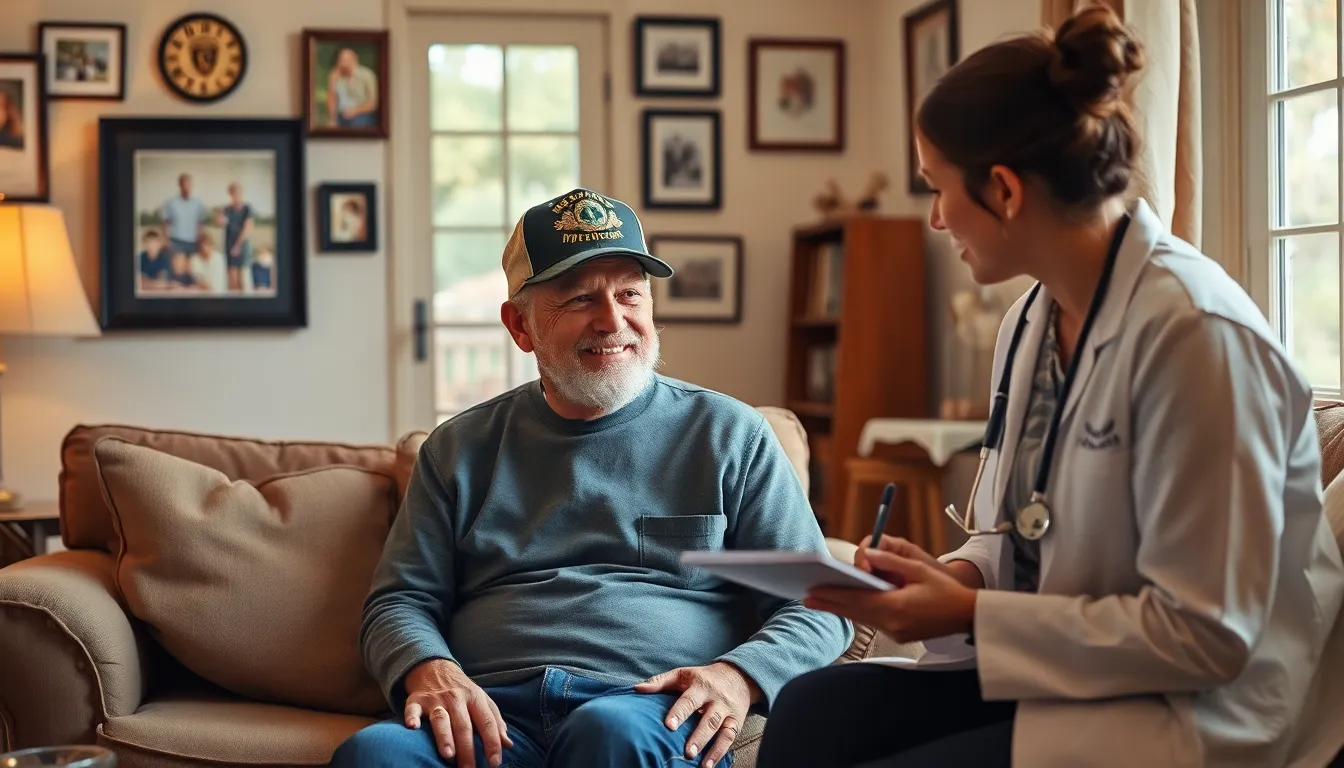Navigating the maze of healthcare can feel like trying to find a needle in a haystack, especially for veterans seeking home health services. They deserve the best care, right in their own backyards. But with so many options out there, it’s easy to feel overwhelmed. Fear not! There’s a treasure trove of home health services tailored specifically for those who’ve served our country.
Table of Contents
ToggleUnderstanding Home Health Care For Veterans
Home health care provides essential support for veterans who require assistance with daily activities and medical care. It’s crucial for ensuring they receive the quality care they deserve in their communities.
Importance of Home Health Services
Home health services enhance the quality of life for veterans. With personalized care, veterans receive convenience and comfort in their familiar surroundings. These services also promote independence, allowing veterans to maintain their daily routines. Access to skilled professionals ensures timely medical attention and support while helping to manage chronic conditions. Many veterans prefer the familiarity of home, and these services align with their emotional and psychological needs that contribute to overall well-being.
Eligibility Criteria for Veterans
Eligibility for home health services depends on various factors, including service-related conditions and income levels. The Department of Veterans Affairs (VA) provides resources to assess eligibility, typically based on medical necessity and the veteran’s needs. Veterans needing assistance must qualify through assessments conducted by healthcare professionals. Specific programs offer services based on age, disability rating, and service duration. Understanding these criteria allows veterans to explore available options for receiving comprehensive home health care tailored to their unique circumstances.
Types of Home Health Services Available

Home health services offer various supports tailored to veterans’ needs, ensuring accessible care at home. These services include skilled nursing, physical therapy, and occupational therapy, all designed to enhance the well-being of veterans.
Skilled Nursing Care
Skilled nursing care provides crucial medical support. Registered nurses deliver services such as medication management, wound care, and monitoring of vital signs. Professionals specialize in chronic illness management, ensuring conditions like diabetes or heart disease are effectively handled. Personalized attention ensures that veterans receive the necessary care during recovery or ongoing treatment. Home health aides can assist with daily activities, further facilitating a smooth recovery process.
Physical Therapy
Physical therapy plays a key role in rehabilitation for veterans. Licensed physical therapists assess individual needs and develop tailored exercise programs. These programs aim to improve mobility, strength, and balance, significantly reducing the risk of falls. Techniques often include manual therapy, exercises, and education on injury prevention. Progress is monitored to adapt the treatment plan as necessary, ensuring optimal recovery outcomes.
Occupational Therapy
Occupational therapy focuses on enhancing daily living skills for veterans. Occupational therapists evaluate challenges faced in routine activities, such as bathing, dressing, and cooking. Adaptive strategies and equipment are introduced to promote independence. Therapy sessions target fine motor skills, cognitive functions, and overall safety within the home environment. Ultimately, this service empowers veterans to participate fully in their lives, contributing to their physical and emotional well-being.
Finding Home Health Services Near You
Home health services for veterans can often be located in their local communities, catering to specific needs. Accessible resources facilitate the search for high-quality care options.
Researching Local Options
Starting with online databases or local VA offices can be beneficial for discovering nearby home health services. Websites like the U.S. Department of Veterans Affairs and aging resource centers provide comprehensive lists. Veterans can also utilize community organizations that focus on veteran support; they often have connections to reliable home health providers. Social media groups and forums allow service members to share experiences and recommendations, creating a valuable network. Local hospitals may also offer referrals to trusted home health care partners.
Evaluating Service Providers
Assessing the quality of potential providers helps ensure veterans receive optimal care. Checking for accreditation from agencies such as the Commission on Accreditation of Rehabilitation Facilities (CARF) is vital. Reading reviews and ratings from past clients gives insights into satisfaction levels and service efficacy. Understanding the types of services available and whether they fit individual needs proves important. Conducting interviews with service providers can clarify their experience with veteran needs and care specifics. Transparency about costs, eligibility, and available services also aids in making informed decisions.
The Benefits of Home Health Care For Veterans
Home health care significantly improves veterans’ overall well-being and provides specialized support tailored to their needs.
Enhanced Quality of Life
Home health care services notably enhance the quality of life for veterans. Personalized attention meets specific health requirements. Access to skilled professionals facilitates timely medical interventions. Medical professionals help manage chronic conditions, reducing hospital visits. Emotional support and companionship are also crucial, addressing social isolation many veterans experience. By promoting a familiar environment, home care allows veterans to maintain routines, reducing stress and anxiety related to unfamiliar settings.
Increased Independence
Independence remains a key focus of home health care for veterans. Supportive services empower veterans to carry out daily activities with confidence. Occupational therapy introduces adaptive techniques and tools, enhancing functional abilities. Veterans can engage more fully in their personal interests, whether gardening or spending time with family. Regular assistance with medications provides peace of mind, knowing that health needs are met without sacrificing autonomy. Empowered veterans experience a greater sense of control over their lives.
Finding the right home health services for veterans is crucial for ensuring they receive the care they deserve. With numerous options available tailored to their unique needs veterans can access skilled support that enhances their quality of life. By understanding eligibility criteria and utilizing local resources veterans can make informed choices about their care.
The benefits of home health services extend beyond medical assistance; they promote independence and emotional well-being. With the right support veterans can continue to thrive in their own homes while managing their health needs effectively. Prioritizing these services not only honors their sacrifices but also empowers them to live fulfilling lives.


